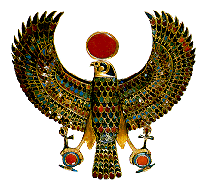
The Principles of Truth are SEVEN; he who knows this,
understandingly possesses the Magic Key before whose touch all the doors of the
Temple fly open.
Kybalion
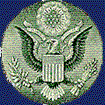
|
The European Enlightenment: had a tremendous impact upon
the United States. Many of the American founders were highly impressed
with and influenced by the Enlightenment. America's 18th Century elite
even picked up an Enlightenment philosophy known as Deism which
believed, as its ancient "Mystery" predecessors, in the enlightenment of
the soul. Though English in descent, many idolized France which was
itself a key nation in the Enlightenment. And as their French
contemporaries, many of America's 18th Century elite were freemasons. A
cursory glance at American symbols such as the great seal show obvious
Egyptian influence, a product no doubt of Enlightenment philosophies.
Pictured above is the great seal. The reverse seal displays a pyramid
with an eye above it. Both are Egyptian symbols, the pyramid being one
of sacred geometry and the "all seeing eye" belonging to none other than
the Egyptian "Child of Light," the god Heru. As if to futher bolster
this connection with Egypt, and in particular Heru the "Child of Light,"
the obverse seal displays the American eagle. Comparing the depiction of
the eagle, wings and talons outstretched with a sunburst above its head,
with the falcon image of Heru (at the top of the page) shows the glaring
similarities. This seal, completed in 1782, would find itself on a host
of American documents including the dollar bill and presidential
proclamations. |
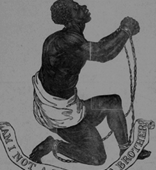
|
The philosophies of the upliftment of the soul did not apply
however to the downtrodden inhabitants of America who suffered under
probably the most harsh form of slavery known to mankind. If any
knowledge of the African contribution to the Enlightenment was known at
the time, it was ignored, misreported and most assuredly kept from any
slaves. American slavery was a brutal and oppressive system that
demanded just the opposite of the Enlightenment philosophies. Virginia
House of Representatives Henry Berry would state proudly, "We have, as
far as possible, closed every avenue by which the light may enter the
slave's mind. If we could extinguish the capacity to see the light, our
work will be complete. They would then be on the level of the beast of
the fields and we then should be safe." And herein lay the greatest
hypocrisy: while knowledge was urged for whites, ignorance was found
necessary for blacks. In fact those who espoused the loudest sentiments
of Enlightenment, such as John Adams, Benjamin Franklin, Thomas
Jefferson and George Washington, were owners of large plantations which
dealt in human misery. But luckily not even so brutal and oppressive an
institution could keep blacks in
darkness. |
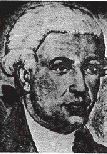
|
Prince Hall was another child of the Enlightenment.
Not much is known of him, but it is believed he came from the Caribbean.
It is rumored, but by no means confirmed, that his father was a white
Englishman while his mother was a free black woman. A free man of color,
Prince Hall arrives in the United States in 1765. Free blacks in the US
at this time did not enjoy all the luxuries of their white counterparts.
And it was probably this second class treatment which allowed many of
them to empathize with their fellow brethren held in bondage. Many in
fact identified with their African heritage, taking a pride in their
beginnings. It was quite common at the time for many free blacks,
already a few generations removed from Africa, to refer to themselves as
"Africans" or "Ethiopians. " So it is not surprising to find black
institutions at the time such as the African Methodist Episcopal (AME)
Church. Prince Hall and 14 other free blacks were initiated into
freemasonry by European freemasons in 1775. However he and his brethren
found themselves treated unequally within the order, and in 1784
petitioned for a move to independence. In 1787 the first African Lodge
of freemasonry was begun in the United States. And thus the secret
society, so fundamental in African history and lost through the
harshness of slavery, became once again a strong institution in the
black community of America. Many of these men charged themselves with
the upliftment not just of themselves, but their brethren who lay in
bondage. And many black freemasons were strong in abolitionist
movements. Thus Prince Hall masons found themselves providing service to
a community well in need. What is more, the African heritage of
freemasonry was not lost upon many of them. And it is even rumored that
Prince Hall, a child of the Enlightenment himself, is one of the first
blacks in America to acknowledge the link between Africa and
Egypt. |
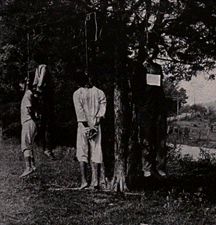
|
As the dust of the Civil war settled and slavery was
eradicated, many Blacks saw an era of prosperity and hope. This dream
was cut drastically as a concerted effort was begun by whites to destroy
any advances which Blacks had made for themselves. This effort was
extremely successful in removing Blacks from the many state and federal
offices which Reconstruction had allowed them to hold. But this was not
enough. The architects of the revived South needed something more to
further the cause of white supremacy and Black oppression. Out of this
need, the era of Jim Crow was born with its "separate but equal" claims.
And with it came a wave of violence against America's newest citizens.
The social atmosphere of white supremacy which Jim Crow had managed to
create soon became a tide of hatred. Bolstered by the idea of the
inferiority of Blacks and the protection of "white womanhood," whites
saw it as nothing to trample Blacks in a storm of violence. These
attacks included lynchings, burnings, and race riots. And though the
majority of this violence took place in the South, the North was by no
means immune. For more than a century, angry whites made the life of
Black America a continuous nightmare. It was out of this atmosphere that
the black college fraternity and sorority was
born. |

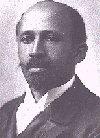
|
To survive these pressures many in the Black community
turned inwards. Key to black America's endurance were secret societies,
such as freemasonry, and the newly formed black colleges. However even
within such institutions, one could not escape the racism that existed
throughout America. And for those who attended white campuses, the
racism of the early 1900s must have been unimaginable: lynchings,
beatings and other forms of racism a daily occurrence. Two of the
greatest ideologies blacks could follow at the moment were those of
Booker T. Washington and W.E.B. DuBois. Washington urged that in the face
of such overwhelming pressures, blacks should create and maintain their
own institutions. He urged blacks to discontinue attempts at integration
and instead focus upon building up the black community. DuBois on the
other hand urged that blacks should fight to receive equal treatment
under the law. And even more importantly he felt that blacks should have
a sense of African cultural identity and self worth. It can be said that
these two ideologies probably helped lay the groundwork for the black
college fraternity and sorority. Following Washington's ideology these
newly founded organizations were built by blacks for blacks. And while
they sought to uplift their communities, they also saw the need to fight
heavily against injustices. Further in the path of DuBois, they imbued
themselves with a strong cultural identity. The first black college
fraternity is often rumored to be Sigma Pi Phi, founded in 1904. But
this is a misnomer. Sigma Pi Phi was founded in 1904 as an organization
for professionals and college graduates and NOT for
black college students. In this sense it was rather much like the other
more established secret societies such as the Freemasons, Eastern stars,
etc. There have been claims that other attempts were made to start
similar black secret societies on white college campuses in the early
1900s. Whatever the case, the first successful attempt is accomplished
in 1906 by 7 college students on the white college campus of Cornell
University. These figures, called the 7 Jewels of Alpha Phi Alpha, laid
the foundation for the remaining black college letter organizations to
follow. Pictured above are Booker T. Washington (left) and W.E.B. DuBois.
|
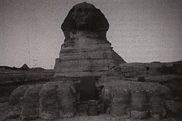
|
These college organizations were born out of a mixture of
black identity, oppression and a legacy that stretches back to Africa
itself. Many of them were formed, in a sense, to emulate freemasons and
the secret societies of most ancient times. (Contrary to rumors however,
these organizations were NOT founded by freemasons nor
organizations such as Sigma Pi Phi.) They served as a place where a
rites of passage could be administered and sought to make men and women
ready to enter society. That they sought to give themselves a "racial
significance" should not be ignored. These organizations were founded to
help black men and women first and foremost. That they sought to imbue
themselves with an African cultural heritage should also not be ignored.
In Alpha Phi Alpha the African connection is readily seen in such
symbols as the Her-em-akhet (sphinx), a symbol representing power,
mysticism and the triumph of knowledge over ignorance, order over chaos,
etc. Another African symbol of Alpha Phi Alpha is the pyramid, a symbol
of foundation, sacred geometry and more. Another glaring example of
Africa in Alpha Phi Alpha is the constant reference to Ethiopia and the
Her-em-akhet, including hymns and poems. Charles H. Wesley would write,
"To the Alpha Phi Alpha brotherhood African history and civilization,
the Sphinx, and Ethiopian tradition bring new meanings and these are
interpreted with new significance to others. As Americans of European
parentage point with pride to the ancestral history of their people, so
Alpha Phi Alpha would have the Negroes of America look with pride upon
African civilization with its kingdoms, its governments and its laws,
its social institutions, its buildings and roads, and its evidences of
indigenous progress, unaffected as it was, by outside influences." If
one looks closely enough at the remaining college letter organizations,
one can see a host of ancient African symbols within them.
|
|
It should first be stated that nothing written on this
page about Alpha Phi Alpha or the remaining organizations are "secret"
in nature. All information given here is of common knowledge(i.e., the
sphinx and its meanings existed long before Alpha Phi Alpha). This page
does not include secret handshakes, words, or any specific secret
information of any organization. If anyone feels as if their
organization has been betrayed by this information, please contact the
author at [email protected]
|
|
While these organizations use Greek letters, that is
probably the most Greek part of them. What is more, a great deal of the
Greek language may be borrowed from the Egyptian lexicon. In fact the
Greek alphabet is Phoenician in origin. And we know that much of
Phoenician culture came by way of Egypt. As for symbols, the green ivy
was said to be sacred to the god Ausar (Osiris) within Egypt. The title
Basileus derives from the word "Basilisk", a griffin like animal often
associated with leadership and royalty. This association can be traced
back to Narmer, the first king of Egypt who has the oldest
griffin-basilisk etched upon the famed Narmer palette. Colors such as
gold and royal blue are sacred Egyptian colors; in fact the "royal" in
royal blue refers to Egyptian royalty. The title Polemarch derives from
the Greek "polemarchos" and was said to be the ceremonial commander of
an army. While the root "polis" is Greek for "city-state," the root
"mar" is derived from the Egyptian "mer m'shau" also meaning "commander
of an army." In Africa elephants were often symbols of power and
intelligence. The Roman Minerva is derived from the Greek Athena,
goddess of wisdom who is herself conceived in Africa. The tale goes that
Zeus, the Greek king of the gods was traveling through Africa when he
was overcome by a terrible headache. He returned to Mt. Olympus where
Hermes (a Greek version of the Egyptian god of wisdom, Tehuti or Thoth)
split open his head with a spike. Out of Zeus' head stepped his newborn
daughter Athena, fully clothed and armored. Athena is thought to be
derived from none other than the Egyptian goddess Neith. In fact the
very word "A-then-a" is thought to be derived from "A-Neith-a." The word
Oracle is also of Egyptian origin. In Egypt the "Tep ra" were thought to
be women who uttered the words of God. It should also be noted that the
most famed of the Greek oracles were described as black women. These are
probably but a few African derived symbols in black letter
organizations. |

|
|
In conclusion we can understand that secret societies are as
old as mankind. And Africa, being the birthplace of mankind, was the
first to create such institutions. They functioned as a rites of passage
for young boys and girls to become men and women of society. They
functioned for the purpose of preparing individuals to become
professionals in whatever caste they may belong. And lastly they
functioned in their highest purpose, the upliftment of the soul and thus
providing the "greatest good" for the individual and society. This was
part and parcel of African societies and could be found interwoven
closely within African religion. Along the Nile region of Africa the
world's oldest cultural complexes arose, Nubia and then Egypt, and from
them these African philosophies found themselves taken into the
Mediterranean and Eastern world. Thus the "Mysteries," as they were
called, flourished from Greece to Persia. It would be centuries later,
in 18th Century Europe, that a fascination with these Mysteries in the
form of the Enlightenment would again arise. And these men, following
the origins of these philosophies, recognized ancient Africa as the
repository of this "enlightened" knowledge. At the root of these
philosophies were such notions as sacred geometry, mental resurrection,
receiving or seeking "light" (knowledge) and the upliftment of the soul.
These 18th Century European men traced not only their Enlightened
philosophies to ancient Africa, but their masonic beliefs as well. The
grand hypocrisy of these men and their Enlightened view of mankind, was
the brutal and oppressive institution of slavery. Thus the descendants
of the very people who gave the world these great philosophies were
denied access to them. But many free blacks of the Enlightenment era
recognized and took pride not only in their individual African roots,
but also in the African origins of these "enlightened" philosophies.
Thus Prince Hall freemasonry was born. After slavery, as oppression took
on new meaning in an era of rampant violence and disfranchisement,
blacks in America looked once more to these secret organizations. In the
new era of black college life, many blacks sought to create
organizations around which to unify themselves. They imbued these
organizations with lofty goals and strong cultural connections which can
be traced to Africa itself. Understanding this may dispel much of the
myth surrounding these black college letter organizations and perhaps
spur them on to continue in a legacy whose roots were laid thousands of
years ago. |
Written by Bro. Dexter Gabriel. Copyright Mu Nu
Chapter 2000. All rights reserved. Except as provided under U.S. copyright
law, all written information may not be reproduced, resold, distributed or
modified without the express permission the Mu Nu Chapter.
Pictures & Information Courtesy of
Black Athena
Vols. I & II by Martin Bernal
Nile Valley Contributions to
Civilization by Anthony T. Browder
History of Alpha Phi Alpha by
Charles H. Wesley
Frat & Soror by James E. Brunson
Man, God
and Civilization by John G. Jackson,
Before the Mayflower by
Lerone Bennett and the
Africana Studies
Research Page
|